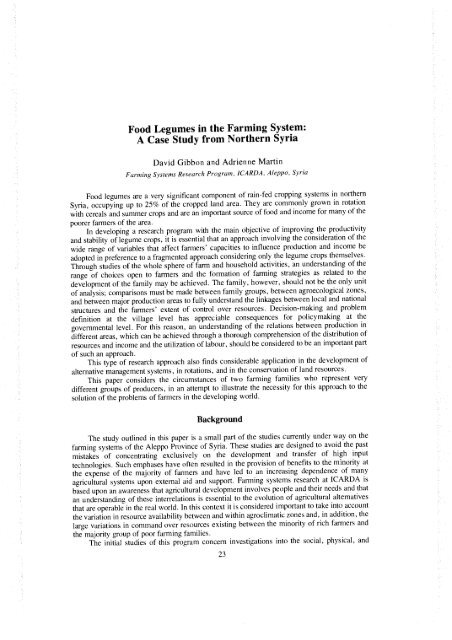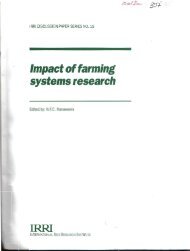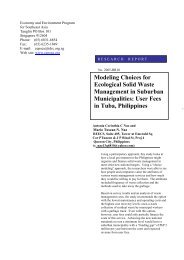I ARCHIV - International Development Research Centre
I ARCHIV - International Development Research Centre
I ARCHIV - International Development Research Centre
- No tags were found...
Create successful ePaper yourself
Turn your PDF publications into a flip-book with our unique Google optimized e-Paper software.
Food Legumes in the Farming System:<br />
A Case Study from Northern Syria<br />
David Gibbon and Adrienne Martin<br />
Farming Systems <strong>Research</strong> Program, ICARDA, Aleppo, Syria<br />
Food legumes are a very significant component of rain-fed cropping systems in northern<br />
Syria, occupying up to 25% of the cropped land area. They are commonly grown in rotation<br />
with cereals and summer crops and are an important source of food and income for many of the<br />
poorer farmers of the area.<br />
In developing a research program with the main objective of improving the productivity<br />
and stability of legume crops, it is essential that an approach involving the consideration of the<br />
wide range of variables that affect farmers' capacities to influence production and income be<br />
adopted in preference to a fragmented approach considering only the legume crops themselves.<br />
Through studies of the whole sphere of farm and household activities, an understanding of the<br />
range of choices open to farmers and the formation of farming strategies as related to the<br />
development of the family may be achieved. The family, however, should not be the only unit<br />
of analysis; comparisons must be made between family groups, between agroecological zones,<br />
and between major production areas to fully understand the linkages between local and national<br />
structures and the farmers' extent of control over resources. Decision-making and problem<br />
definition at the village level has appreciable consequences for policymaking at the<br />
governmental level. For this reason, an understanding of the relations between production in<br />
different areas, which can be achieved through a thorough comprehension of the distribution of<br />
resources and income and the utilization of labour, should be considered to be an important part<br />
of such an approach.<br />
This type of research approach also finds considerable application in the development of<br />
alternative management systems, in rotations, and in the conservation of land resources.<br />
This paper considers the circumstances of two farming families who represent very<br />
different groups of producers, in an attempt to illustrate the necessity for this approach to the<br />
solution of the problems of farmers in the developing world.<br />
Background<br />
The study outlined in this paper is a small part of the studies currently under way on the<br />
farming systems of the Aleppo Province of Syria. These studies are designed to avoid the past<br />
mistakes of concentrating exclusively on the development and transfer of high input<br />
technologies. Such emphases have often resulted in the provision of benefits to the minority at<br />
the expense of the majority of farmers and have led to an increasing dependence of many<br />
agricultural systems upon external aid and support. Farming systems research at ICARDA is<br />
based upon an awareness that agricultural development involves people and their needs and that<br />
an understanding of these interrelations is essential to the evolution of agricultural alternatives<br />
that are operable in the real world. In this context it is considered important to take into account<br />
the variation in resource availability between and within agroclimatic zones and, in addition, the<br />
large variations in command over resources existing between the minority of rich farmers and<br />
the majority group of poor farming families.<br />
The initial studies of this program concern investigations into the social, physical, and<br />
23

















